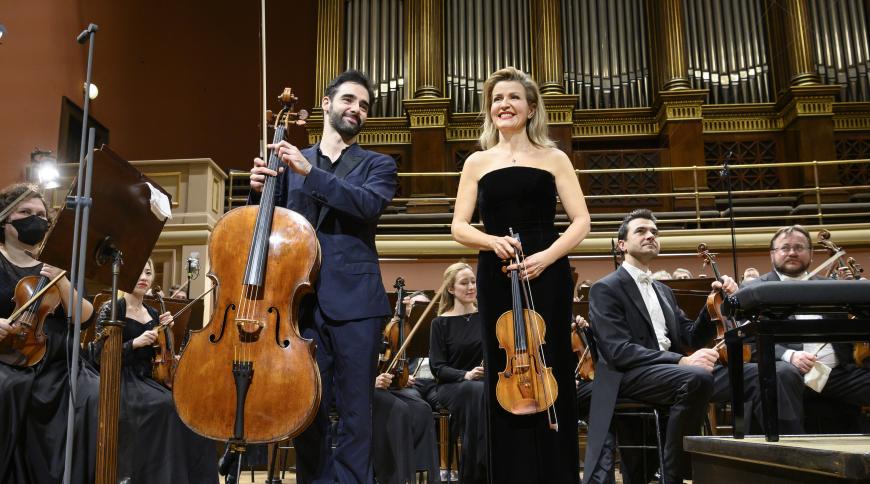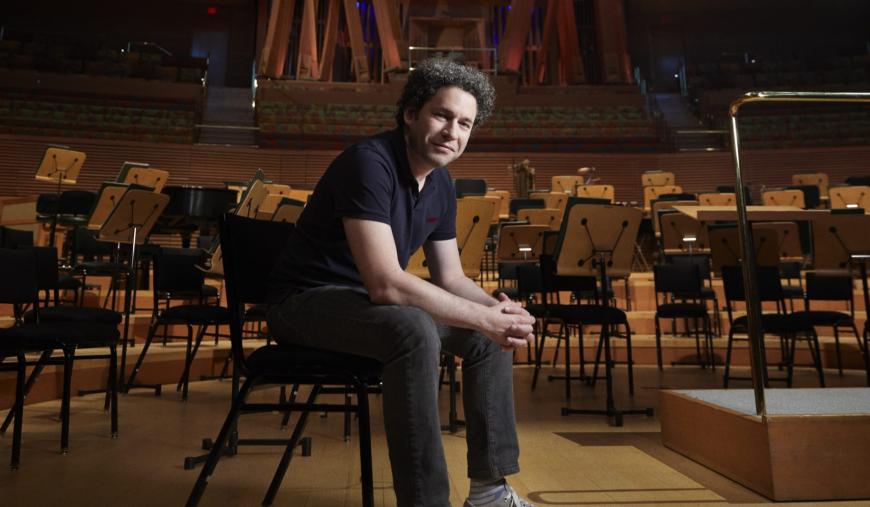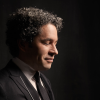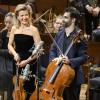
Matinee performances are somewhat of a contradiction. They’re attended by highly receptive audiences that include children, families, and older patrons. For musicians, though, they’re often moments of low ebb — one’s last experience with a familiar program, when it may be difficult to bring novelty or drama to the interpretation.
On Jan. 28 at Disney Hall, the Los Angeles Philharmonic and Music and Artistic Director Gustavo Dudamel tackled two works that demand drama and investment — Brahms’s Double Concerto and Anton Bruckner’s First Symphony. But rather than succumbing to fatigue after a weekend of performances, the orchestra gave the vocally appreciative audience something to cheer for, buoyed by star turns from soloists Anne-Sophie Mutter and Pablo Ferrández that had all the vigor of a Friday-night debut.
Mutter and Ferrández’s Brahms Double Concerto on Sunday afternoon proved a powerful advertisement for their recent critically-acclaimed recording of the work for Sony Classical. Often, this piece is a showcase for two lauded soloists, uniting as if by accident. Though Mutter and Ferrández are stars in their own right, it is the deeply collaborative idiom they find that makes their interpretation (both recorded and live) remarkable. The instantaneous ovation from Sunday’s crowd felt motivated not just by the performance’s impeccable athleticism but by its considerable charm.
Ferrández is a strikingly imaginative player. His widest, most expressive vibrato — deployed judiciously at the apexes of phrases — so often wrung an extra measure of yearning out of the first movement’s soaring melodies. That same vibrato, in a reversal of typical instrumental roles, drove the brilliance of the duo sound.
By contrast, Mutter’s playing possessed an intense gravity, which provided the core of the soloist sound across the outer movements’ sinuous octave-driven filigree and declamatory double- and triple-stops. In the slow movement’s early going, Mutter delivered some of the night’s most electrifying moments, as delightfully hoarse and thick utterances emerged from her violin’s G string.
The LA Phil provided a tempered base that supported all the subtleties of the soloists’ unmuscled interpretation. String playing always communicated the agitation and turmoil of Brahms’s motoric figures but modulated in intensity across tutti and solo-driven sections with subtle mechanics. The winds, often deployed as an ensemble in the concerto’s thematic transitions, took up and transformed the energy at the end of solo interludes, pressing forward with shapely phrasing.
A similarly measured quality characterized the orchestra’s rendition of Bruckner’s towering First Symphony. But while this affect read supportively in the Brahms, it lent the afternoon’s large orchestral work an air of undue caution.

In his approach to the symphony, Dudamel favored economical but weighty gestures. This ensured that the players’ attacks never became overly bombastic in the piece’s spiky, suppressed opening theme. However, that decision also limited the momentum of the first movement’s sprawling phrases. When episodes like a melodic interlude from the viola section took off, they underscored the surrounding hesitation. It took the slow movement to coax more directional phrases out of the ensemble.
The performance seemed concerned, in whole, with creating a hierarchy of climaxes that would limit the audience’s fatigue with the monumental work and its many expressions of pique. That holding back, however, deprived the music of too many moments of release. Though the third movement’s closing brass chorale and the Finale’s fiery fits landed with requisite heat, the interpretation could have maintained more consistent gusto, as the LA Phil’s bassists did across their titanic part.
Though there is an ideological rift that separates Brahms’s and Bruckner’s philosophies of composition, both these works, as John Henken’s program note pointed out, are full of brilliance and spirit. Despite the timidity in the Bruckner, Sunday’s performance was largely successful in bringing that spirit to the fore.




